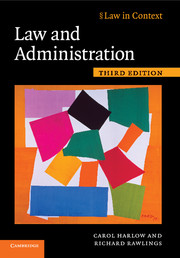Book contents
- Frontmatter
- Contents
- Preface
- Table of Cases
- Table of Statutes
- 1 Red and green light theories
- 2 The changing state
- 3 Transforming judicial review
- 4 Making the law
- 5 Rules and discretion
- 6 Regulation and governance
- 7 Regulatory design and accountability
- 8 Contractual revolution
- 9 Contract, contract, contract
- 10 Into the jungle: Complaints, grievances and disputes
- 11 Tribunals in transition
- 12 The Parliamentary Ombudsman: Firefighter or fire-watcher?
- 13 Inquiries: A costly placebo?
- 14 Continuity and change: Procedural review
- 15 Elite dimension: Court structures and process
- 16 Judicial review and administration: A tangled web
- 17 ‘Golden handshakes’: Liability and compensation
- Index
4 - Making the law
Published online by Cambridge University Press: 05 June 2012
- Frontmatter
- Contents
- Preface
- Table of Cases
- Table of Statutes
- 1 Red and green light theories
- 2 The changing state
- 3 Transforming judicial review
- 4 Making the law
- 5 Rules and discretion
- 6 Regulation and governance
- 7 Regulatory design and accountability
- 8 Contractual revolution
- 9 Contract, contract, contract
- 10 Into the jungle: Complaints, grievances and disputes
- 11 Tribunals in transition
- 12 The Parliamentary Ombudsman: Firefighter or fire-watcher?
- 13 Inquiries: A costly placebo?
- 14 Continuity and change: Procedural review
- 15 Elite dimension: Court structures and process
- 16 Judicial review and administration: A tangled web
- 17 ‘Golden handshakes’: Liability and compensation
- Index
Summary
Legislation and constitutional change
Since at least the nineteenth century, a first objective for lawyers has been to arrange legal norms logically and in a hierarchical fashion. This is the essence of both Dicey's nineteenth-century doctrine of parliamentary sovereignty and Hart's celebrated theory of primary and secondary rules (see Chapter 1), each of which seeks to establish when and why rules are binding and to be obeyed. The fact that the constitution is unwritten sets statute law at the apex of the hierarchy of legal norms; the prerogative powers, historical rival of parliamentary legislation, are nowadays subordinate to statute and those remnants of the prerogative legislative powers that remain in respect of colonial territories are controversial and subject to review by the courts. At the other end of the spectrum, the borders between law and non-law are not always easily discernible. It may often be hard to differentiate the confusing ‘ragbag of rules, regulations, orders, schemes, byelaws, licences, directives, warrants, instruments of approval or minutes’ that bear the label delegated legislation, from the confusing ragbag of directives, circulars, guidance, guidelines and codes of practice that clutter the desks – and computer screens – of bureaucrats. Discussion of this mass of ‘soft law’, generated by the use of rule-making as a standard technique of modern bureaucracy and e-governance, is reserved for Chapter 5.
A sharp line is commonly drawn between statute law, which falls into the field of constitutional law, and secondary legislation which, merely by virtue of being made by the executive or other authorised public bodies, falls within the purview of administrative law.
- Type
- Chapter
- Information
- Law and Administration , pp. 140 - 189Publisher: Cambridge University PressPrint publication year: 2009



